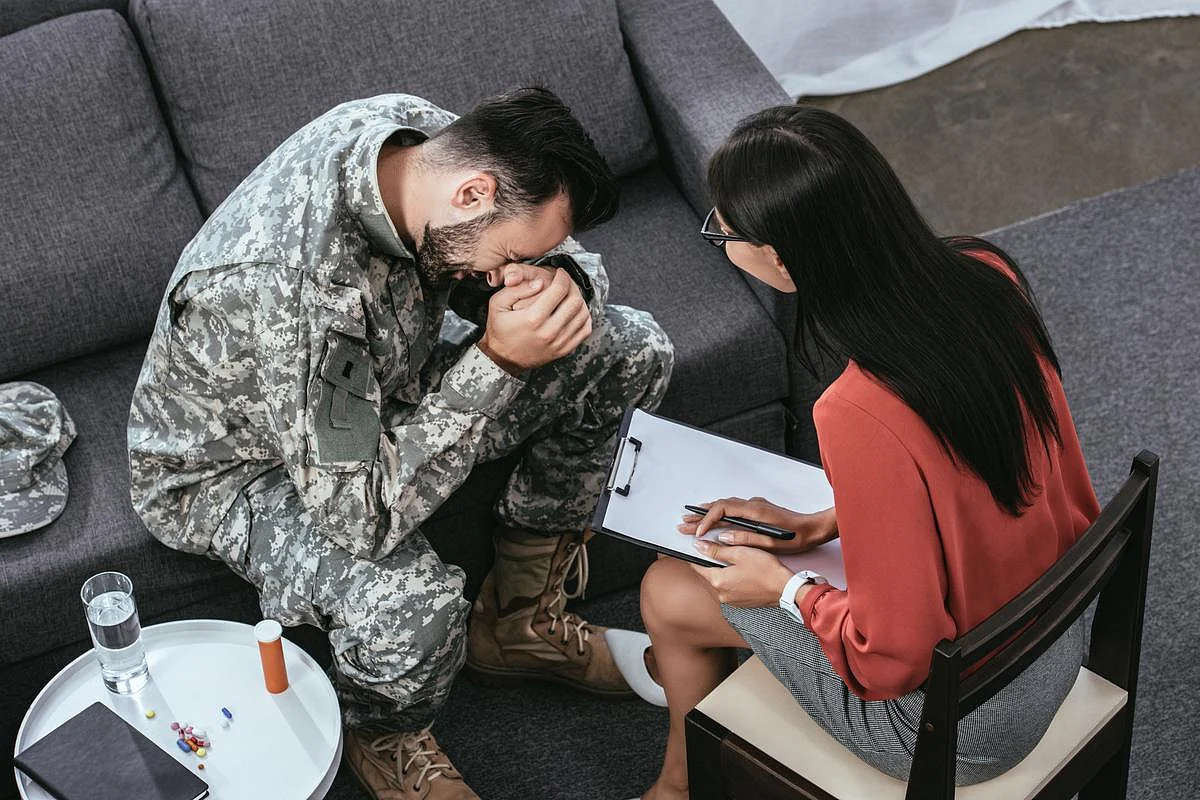Get Healthy!

- Dennis Thompson
- Posted July 25, 2025
African Psychedelic Might Help Combat Vets Recover From Traumatic Brain Injury
Veterans who receive traumatic brain injuries in combat often experience crippling post-traumatic stress disorder, anxiety and depression, leaving them hopeless and potentially suicidal.
But help might be on the way from an unlikely source – a psychedelic drug called ibogaine.
The drug, derived from the roots of an African shrub called iboga, can safely and effectively treat long-term symptoms of traumatic brain injury in veterans, according to findings from a study of 30 vets recently published in the journal Nature Mental Health.
The veterans crossed the border into Mexico to receive treatment with ibogaine, which is outlawed in the U.S., researchers said.
“Before the treatment, I was living life in a blizzard with zero visibility and a cold, hopeless, listless feeling,” study participant Sean, a 51-year-old veteran from Arizona with six combat deployments, said in a news release. “After ibogaine, the storm lifted.”
Scans reveal that ibogaine alters brain activity in ways that can lower stress and help veterans better process their trauma, researchers found.
“No other drug has ever been able to alleviate the functional and neuropsychiatric symptoms of traumatic brain injury,” senior researcher Dr. Nolan Williams, an associate professor of psychiatry and behavioral sciences at Stanford Medicine in Palo Alto, Calif., said in a news release. “The results are dramatic, and we intend to study this compound further.”
People who take ibogaine often report the experience as a “waking dream,” in which they reflect upon memories and witness intense hallucinations, according to the University of California-Berkeley Center for the Science of Psychedelics.
The compound is used in African religious ceremonies, and has been studied as a potential antidepressant and aid to shake drug addiction, the UC-Berkeley Center says.
Ibogaine has been designated a Schedule 1 controlled substance since 1970 in the United States, preventing its medical use. However, clinics in both Canada and Mexico offer legal ibogaine treatments, researchers noted.
For this research, researchers worked with a small group of 30 special operation veterans who had long-term symptoms from traumatic brain injuries and repeated exposure to blasts.
“There were a handful of veterans who had gone to this clinic in Mexico and were reporting anecdotally that they had great improvements in all kinds of areas of their lives after taking ibogaine,” Williams said. “Our goal was to characterize those improvements with structured clinical and neurobiological assessments.”
Independently, the veterans signed up for ibogaine treatment at a Mexican clinic run by Ambio Life Sciences, researchers said. They were assisted by VETS Inc., a foundation that helps facilitate psychedelic-assisted therapies for veterans.
The clinic provided oral ibogaine under medical monitoring, along with a dose of magnesium to help prevent heart complications that have been associated with the drug, researchers said.
“These men were incredibly intelligent, high-performing individuals who experienced life-altering functional disability from TBI during their time in combat,” Williams said. “They were all willing to try most anything that they thought might help them get their lives back.”
Stanford doctors assessed the veterans prior to their sojourn in Mexico and gave them a follow-up exam once they’d returned to the States.
Among the 30 veterans, 23 met the criteria for PTSD, 14 for anxiety disorder and 15 for alcoholism, researchers said. About 19 of the participants had been suicidal at some point, and seven had attempted suicide.
Within one month of ibogaine treatment, the vets experienced an average 88% reduction in PTSD symptoms, 87% in depression symptoms and 81% in anxiety symptoms, researchers report.
They also experienced reduced disability and improvements in their concentration, information processing, memory and impulsivity, results show.
“I wasn’t willing to admit I was dealing with any TBI challenges. I just thought I’d had my bell rung a few times — until the day I forgot my wife’s name,” Craig, a 52-year-old study participant from Colorado who served 27 years in the U.S. Navy, said in a news release.
“Since [ibogaine treatment], my cognitive function has been fully restored,” Craig continued. “This has resulted in advancement at work and vastly improved my ability to talk to my children and wife.”
EEG and MRI brain scans reveal why the drug might help veterans, researchers said.
Veterans whose ability to plan and organize improved after ibogaine treatment tended to show an increase in brain waves called theta rhythms, results show. Stronger theta rhythms might encourage neuroplasticity and cognitive flexibility.
Likewise, those with reduced PTSD symptoms tended to display less complex brain activity in the cortex – a sign that the drug helps lower the heightened stress response associated with the disorder.
These sorts of brain scans might help doctors identify patients who could most benefit from ibogaine, researchers said.
There were no serious side effects from ibogaine, and no instances of heart problems, researchers said. During treatment, the veterans reported typical symptoms like headache and nausea.
Based in part on these findings, Texas recently approved a $50 million initiative to fund clinical trials of ibogaine. The program will provide matching state funds for private investments in ibogaine trials that might lead to U.S. Food and Drug Administration approval, researchers said.
“In addition to treating TBI, I think this may emerge as a broader neuro-rehab drug,” Williams said. “I think it targets a unique set of brain mechanisms and can help us better understand how to treat other forms of PTSD, anxiety and depression that aren’t necessarily linked to TBI.”
The study did not receive any funding from Ambio Life Sciences or VETS Inc., researchers noted.
More information
The University of California-Berkeley Center for the Science of Psychedelics has more on ibogaine.
SOURCES: Stanford Medicine, news release, July 24, 2025; Nature Mental Health, July 24, 2025

